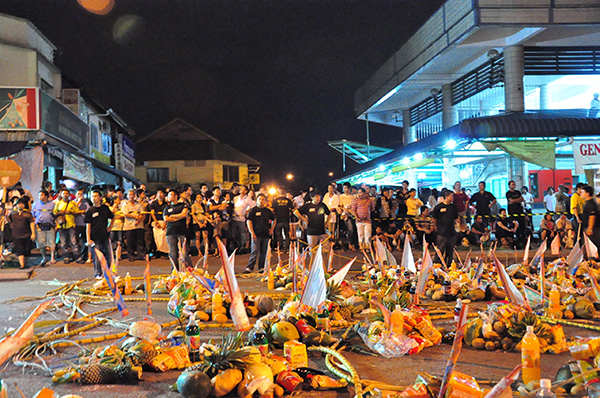
Elaborate offerings laid out to mark the Festival of the Hungry Ghosts.
SOON it will be that time of the year again when the pearly gates are flung open to turn hungry souls loose on the earthly world in search of food and entertainment to sate their voracious appetite and sense of drama.
It’s the Zhong Yuan Festival or the Ghost Month which starts on Aug 17, the 15th night of the Seventh Lunar Month, when the gates of hell will be unlocked, setting free ghosts and demons of all kinds to roam the realm of the living.
They will be lurking and prowling around, looking for a hearty feast and a bit of ‘Broadway’ entertainment. And they are very hungry!
These spirits are believed to be the ancestors of those who forgot to pay tribute to them after they died or those who did not give their forebears a proper send-off ritual.
In Chinese culture, the 15th Day of the Seventh month in the Lunar Calendar is called the Ghost Day or the Hungry Ghost Festival, and the Seventh month is generally regarded as the Ghost Month.
The Festival of the Hungry Ghosts is the traditional belief of the Chinese who are Taoists or Buddhists although it is also observed by the Chinese community at large.
Spooky though as it might sound, rest assured we do not really have anything to worry about. After all, nobody has ever bumped into any of the ‘good brothers’ and ended up on their menu before — at least not yet as some like to believe.
Part of the reason why we need not be overly concerned about these purportedly ravenous spooks is that the Chinese who observe the Ghost Month have many ritualistic protocols to appease and make them as harmless as butterflies.
Family members offer prayers, food and drinks and burn hell money and other types of joss paper for their beloved departed because these items are believed to have value in the afterlife — quite similar in some respect to the material world.
Paper symbols such as cars, houses, TVs, clothes, shoes, watches, cigarettes, cheque books, passports, electronic gadgets (mobile phones and iPads) and even house servants are burnt as offerings to tide over deprived lost souls in the underworld.
Tribute is also paid to other spectral wanderers so that these homeless souls will not disturb the living and bring misfortune.
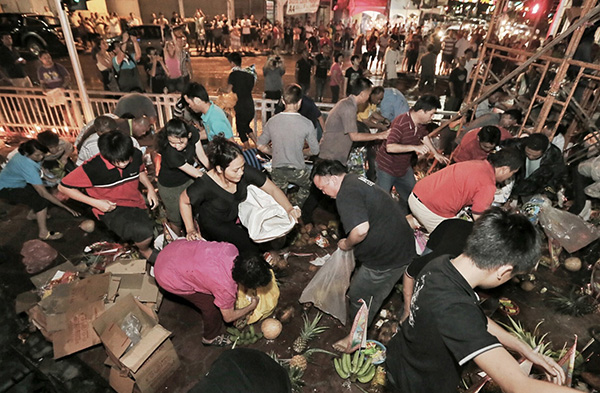
Worshippers scurry to collect food items after the priests offer prayers and sprinkle flour to symbolically feed the hungry ghosts.
Entertaining ghostly audience
Stage shows like Chinese operas and dramas are held during the Ghost Month as well. More often than not, the front rows are left empty — reserved for the ghostly audience as it were. In certain parts of some Asian countries, the front row or back rows in cinemas are also left empty for the same reason.
According to the Kuching Chinese Community Charitable Trust Board chairman, Dr Chou Chii Ming, Zong Yuan Festival is a term used by the Chinese community while the term Yu Lan Pen Jie is associated with Buddhism.
He said it was not appropriate to call the Festival a Ghost Month because it sounded rude, adding that Ghost Month was only a colloquial term.
“We don’t agree the offerings are for all ghosts because it’s also about respect to those who have passed away. Every year, we make such offerings to remember and respect the departed, and also save those reborn into the unhappy realms,” he added.
According to Buddhist beliefs, when people pass away, they are subjected to reincarnation in one of the six realms, depending on what they did during their lifetime.
If they did good things, they could be reborn into the Heavenly Kings, Asuras-Titans and Human Beings, the first three of the six realms of being.
If during their lifetime they did bad things, they could be reborn into the other three realms — as hungry ghosts or animals or into hell.
Notable difference
According to Chou, there is a notable difference between Taoist and Buddhist legends of the festival.
The Taoist legend revolves around appeasing the wandering souls while that of the Buddhists is more orientated towards filial piety.
He said based on a reference school textbook about Chinese Festivals, published in Singapore, the 15th of the First, Seventh and 10th months were known as the Three Yuan in olden times.
Since time immemorial, the Chinese have believed during the First to the 30th Days of the Seventh month, the gates of hell are opened, releasing hungry ghosts to roam the Earth.
Originally, Zhong Yuan Festival was a day for remembrance of ancestors but after Buddhism was introduced to China, the festival took on a Buddhist flavour and became known as Yu Lan Pen Jie, long thought to be the Chinese transcription of the Sanskrit term Ullambana which, in Chinese, means “to be suspended upside down”.
The term Yu Lan Pen Jie is associated with Buddhism. On Zhong Yan Festival, each Buddhist temple forms a Yu Lan Pen Society, which lights lanterns and recites sutras to lead those in hell across the sea of suffering.
According to Buddhist sutras, Buddha once commanded one of his disciples, Mu Lian, to save his mother who was reborn among the hungry ghosts in hell where she was not allowed to eat anything or join a Yu Lan Pen Society.
On the 15th Day of the Seventh month, the society will put all kinds of fruits into basins as offerings to nurture great virtues in the 10 quarters — the eight compass points above and below.
The Buddhist emperor Liang Wudi of the Liang Dynasty was responsible for popularising the observation of Zhong Yuan among the masses.
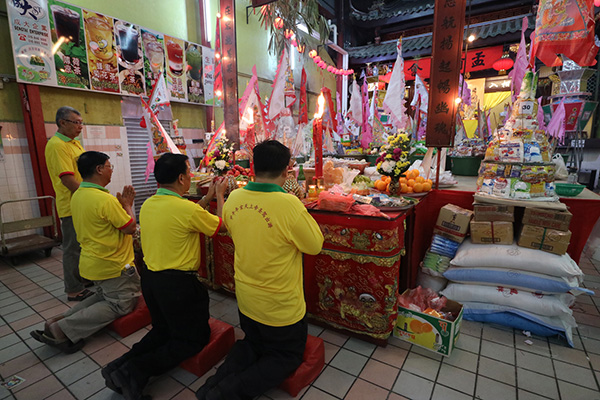
The faithful pray at the temple during the Zhong Yuan Festival.
Dos and don’ts
On the dos and don’ts for believers during the Ghost Month, Chou said if all the must-not-do things were to be recorded down, the checklist would go on and on till the end of time.
“What most Chinese tend to pay more attention to is trying to avoid doing very important things during the Ghost Month such as not holding weddings or making major decisions, not signing business deals or doing house renovation or throwing a house warming party and such like,” he added.
thesundaypost also spoke to a few people who have some knowledge of the dos and don’ts.
Nonagenarian Lim Oh Teck said devotees would prepare lavish feasts (usually vegetarian food) for the hungry ghosts and burn joss sticks, joss papers, incense or paper replicas of whatever things people imagined the spirits may fancy or need.
The 93-year-old pointed out that how people gratified these wandering phantoms could differ from place to place across Asia.
One common feature is holding operas to ‘entertain the ghosts’
and, not surprisingly, these spooks are to be treated like VIPs with premium seats reserved for them — which is why we always see front row chairs of opera galleries being left empty.
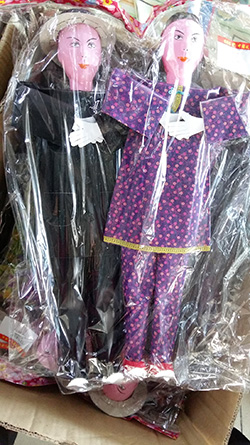
Paper servants bound for the netherworld.
Rules and taboos
On the rules and taboos during the Festival, 63-year-old Tanny Lee said he knew of some instances where bad things happened to those who offended the souls of their departed ancestors by breaking the fiats.
After all, he noted, the convention had been passed down from generation to generation and these people must have the accumulated knowledge of what had been observed or experienced through the ages.
He said among some of the more interesting don’ts (forbidden practices) were peeing at the foot of an old tree because a spirit might be resting there, leaving an umbrella open overnight outside the house
because spirits liked to take
shelter at such places and killing any weird-looking insects because they might be the manifestation of our ancestors paying us a visit.
Other don’ts, he added, included calling out a person’s name too loudly around midnight lest the ghosts might hear it and imitate the caller’s voice in calling out the person’s name to lead him or her into harm’s way, and hanging clothing outside the house at night as the ghosts might try them on and leave behind other-worldly charms or residues that could cause sicknesses.
Octogenarian Ng Kie En said he knew of one taboo which forbade stepping on or kicking the offerings by roadsides, adding that one should apologise immediately to the ghosts if one did so accidentally.
There are other taboos, according to the 86-year-old, such as not wearing red because ghosts are attracted to red; not talking about ghosts during their special month because it may offend them; avoiding swimming because the ghost of a drowned person might pull you under and refraining from using a mirror at midnight as it may reflect double images — yours and the ghost’s.
More don’ts from various sources:
- Don’t camp outdoor during the night.
- Don’t whistle on a quiet street at night.
- Avoid travelling.
- Don’t pick up coins or money on the street.
- Don’t peel apples and light white candles in the front of a mirror.
- Don’t leave chopsticks standing up in a rice bowl as the chopsticks may be mistaken for joss sticks and the rice bowl for a bowl of rice being offered to the hungry ghosts.
- Never stand near to any offerings as the ghosts might think you are part of the package.
Unassailed by modernity
Given the ingenuity of human imagination, we can always expect, with passing time, all kinds of add-ons to the existing myths and beliefs related to the Zhong Yuan Festival.
Even in an era advanced science and technology, the tendency to be superstitious is still inherent in humans. We only have to look at paper replicas of all kinds of modern gadgets or items such as cars, computers, radio and hi-fi sets, mobile phones and credit cards — or just about anything luxurious or otherwise — which are burnt in rituals to symbolise sending the items to the departed for use in the netherworld.
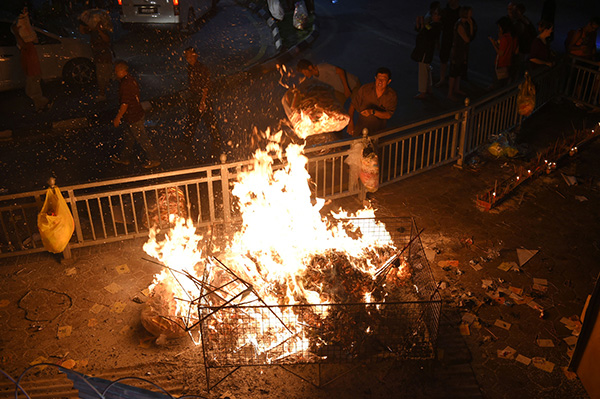
Devotees burn items made of paper such as hell money and houses as offerings to the hungry ghosts.
Origin of Zhong Yuan Festival
There are a number of versions as to the origin of the Zhong Yuan Festival and scholars cannot identify a single clear one. Some point to Buddhist and Taoist texts, others to Chinese folklore, much of which is strikingly similar.
In some regions, such traditions are mixed and the festivals celebrated together. Activities are most auspicious on the 15th Day of the Lunar Month but in many places, the festival lasts an entire month.
According to Taoist beliefs, there are three deities who control humankind. One grants happiness (Tian Guan Da Di), the other pardons sins (Di Guan Da Di), while a third alleviates dangers (Shui Guan Da Di).
The birthday of Di Guan Da Di falls on the 15th Day of the Seventh Lunar Month when the deity descends to Earth to record the good and evil deeds of each human being.
This is also the period when hungry souls are released from the underworld to wander around, seeking sustenance and entertainment — hence the food offerings and the operas.
It is also during this period that devotees can visit the temples to repent and pray for happiness and protection from ill fortune.
As for the Buddhist version, there was this disciple of the Buddha named Mu Lian who tried to save his mother from torture in hell. His vegetarian mum had accidentally taken some meat soup and was condemned to hell for denying her mistake.
Mu Lian somehow came to know about his mother dwelling among the hungry ghosts in the spirit world but each time he sent his starving mother offerings of food, they were grabbed by other hungry ghosts.
According to another version, Mu Lian sent his mother a bowl of rice as an offering but the rice turned into burning coals. Mu Lian then appealed to Buddha for help and Buddha taught Mu Lian how to make offerings of special prayers and food to relieve his mother’s suffering as a hungry ghost.
The Ghost Month is observed in some form or another in many Asia countries, including China, Malaysia, Thailand, Cambodia, Singapore, Vietnam, Japan and India.
